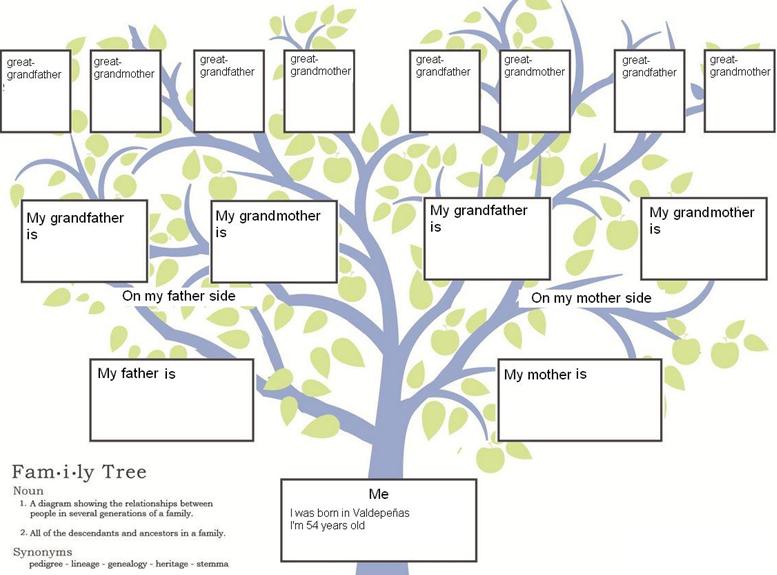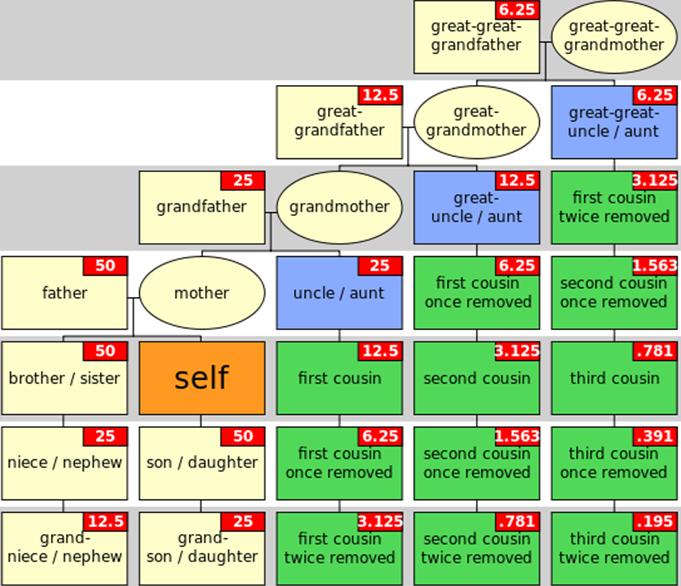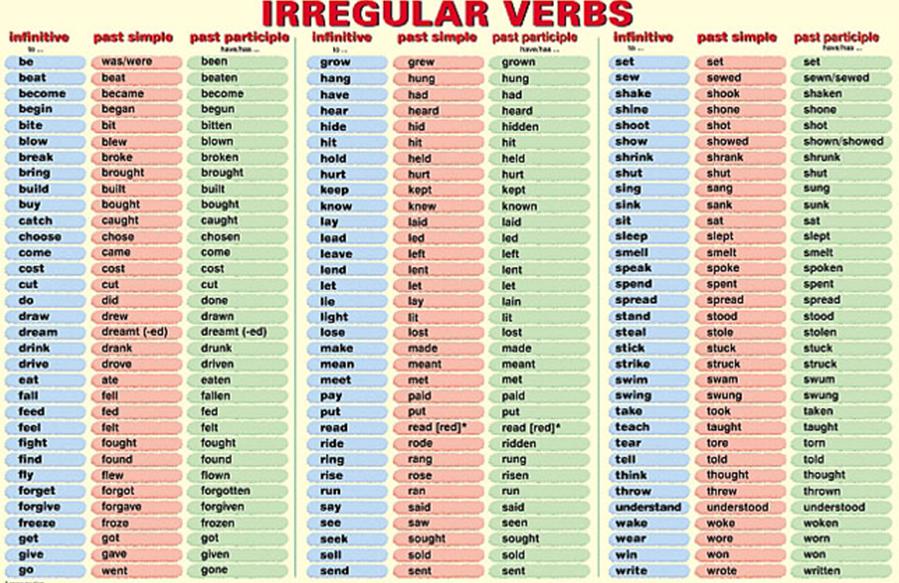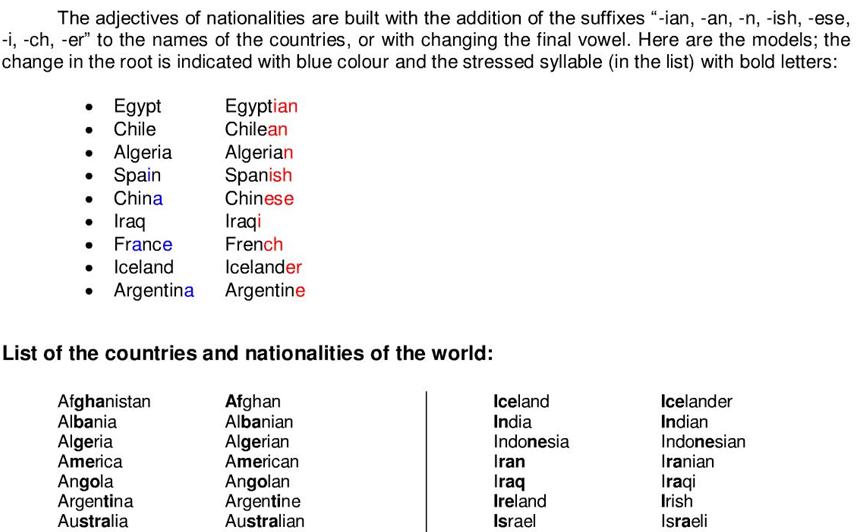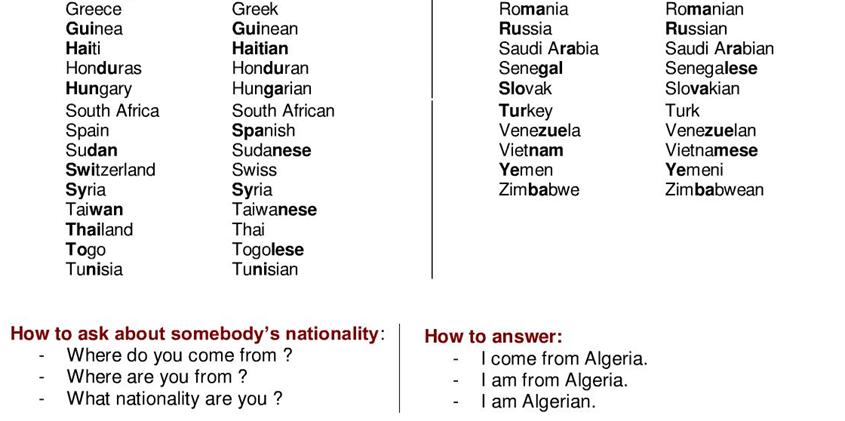|
Family tree
1.-My brothers’s wife name is... 2.- Only child. 3.- What’s the typical Spanish family like? 4.- Who’s the head of the family nowadays? Talking about family names, include a picture. Who makes the big decisions? Another big decision What supposed I should to do? Looking back Are there so many divorces as statistics say? Slow down (en las señales de tráfico before ceda el paso) When do children leave the parent’s home? Boomerang children (van y vuelven) Lend a hand (echar una mano) Teacher’s email: patricia@eoisantander.org Student’s email: EnglishCep2013@gmail.com password: changing year to maxime grate It depends on Who do you think you are? (cambia el significado según la entonación que le demos) PAISES Y NACIONALIDADES People from Colombia are Colombians. People from Ireland are Irish. VIDEO He works in the post office GREAT IRISH FAMINE Great Plague Famine in Irlande, 1843 year, people from Ireland came to north Spain in 1843 because there was a Great Plage Famine in their country, Ireland. Rackers, … Some Santander’s words are Irish words. In Ireland, the Great Famine was a period of mass starvation, disease and emigration between 1845 and 1852[1] It is sometimes referred to, mostly outside Ireland, as the Irish Potato Famine because one-third of the population was then solely reliant on this cheap crop for a number of historical reasons.[2][3][4] In the Irish language it is called an Gorta Mór(IPA: , meaning "the Great Hunger")or an Drochshaol ( meaning "the bad life"). During the famine approximately 1 million people died and a million more emigrated from Ireland,causing the island's population to fall by between 20% and 25%. The proximate cause of famine was a potato disease commonly known aspotato blight The usage of the word "famine" is a misnomer. Although the potato crop failed, the country was still producing and exporting more than enough grain crops to feed the population. Records[which?] show during the period Ireland was exporting approximately thirty to fifty shiploads per day of food produce. As a consequence of these exports and a number other factors such as land acquisition, absentee landlords and the effect of the 1690 penal laws, the Great Famine today is viewed by a number of historical academics[who?] as a form of either direct or indirect genocide. The famine was a watershed in the history of IrelandIts effects permanently changed the island's demographic, political and cultural landscape. For both the native Irish and those in the resulting diaspora, the famine entered folk memoryand became a rallying point for various Home rule and United Ireland movements, as the whole island was then part of theUnited Kingdom of Great Britain and Ireland. The massive famine soured the already strained relations between many of the Irish people and the British Crown, heightening Irish republicanism, which eventually led to Irish independence in the next century. Modern historians regard it as a dividing line in the Irish historical narrative, referring to the preceding period of Irish history as "pre-Famine"
TEACHER’S BOOKS English new file Oxford Intermediate Pathways2 Teacher’s guide
Hello Jesús, GRAMMAR Un audio en http://www.ivoox.com/tu-ingles-sesion-25-especial-irregular-verbs-audios-mp3_rf_35726_1.html Regular verbs
English regular verbs change their form very little (unlike irregular verbs). The past tense and past participle of regular verbs end in -ed, for example:
But you should note the following points: 1. Some verbs can be both regular and irregular, for example:
2. Some verbs change their meaning depending on whether they are regular or irregular, for example "to hang":
3. The present tense of some regular verbs is the same as the past tense of some irregular verbs:
Irregular verbs
IRREGULAR VERBS INFINITIVE= PAST SIMPLE=PAST PARTICIPLE Cost Cut Hit Hurt Set Shut/cerrar rápidamente: shut up= cállate Let Put Read Spread bid/pujar, rogar, ofrecer broadcast
AS KNOW Know knew known Blow blew blown Grow grew grown throw threw thrown draw drew drawn fall fell fallen fly flew flown
AÑADEN D d+d=T e+d=T m+d=t n+d=t lay laid laid pay paid paid say said said lend lent lent spend spent spent send sent sent hear heard heard dream dreamt dreamt mean meant meant lose lost lost build built built
AS KEEP KEPT KEPT (pierden la doble vocal o la segunda de la sílaba o lo que haya doble y añaden t, ve=f, si el final es t o d no la añaden) Keep kept kept Sleep slept slept Smell smelt smelt Feel felt felt Leave left left Feed fed fed/cebar Lead led led Meet met met Shoot shot shot
WITH GHT Bring brought brought Fight fought fought Think thought thought Buy bough bought Seek sought sought Teach taught taught Catch caught caught
AS RING RANG RUNG Begin began begun Drink drank drunk Ring rang rung Run ran run Shrink shrank shrunk/Encoger Sing sang sung Sink sank sunk/hundirse: Very few rocks float. Most of them sink Swim swam swum/nadar
AS STRIKE sink sunk sunk stick stuck stuck strike struck struck swing swung swung/balancearse dig dug dug/cavar find found found hang hung hung stand stood stood understand understood understood tell told told sell sold sold hold held held shine shone shone win won won sit sat sat
AS TAKE take took taken shake shook shaken/sacudir, agitar wake woke woken break broke broken speak spoke spoken steal stole stolen
OTHERS bite bit bitten hide hid hidden ride rode ridden rise rose risen drive drove driven write wrote written freeze froze frozen
give gave given forgive forgave forgiven get got gotten forget forgot forgotten come came come become became become tear tore torn wear wore worn
lie lay lain eat ate eaten beat beat beaten sew sewed sewn/sewed see saw seen
SONG I Believe I Can fly http://www.youtube.com/watch?v=QTahrYXCChI Wiht lyrics http://www.youtube.com/watch?v=zK2ZuescJGA
The next day talk about our dreams, our jobs. There was any family rumor.
I am Chilean.
Below is a list of countries with the appropriate nationality. The Language that appears is the main language that is spoken in the country. We have not included all the languages that they may speak in that country. AUDIO
*You will notice that people from United States have the nationality 'American'. Some people from other parts of the American continent (especially Central and South America) tend not to like the word American for people from the United States. You will find that they will call them North American.
previous class next class Home
|
